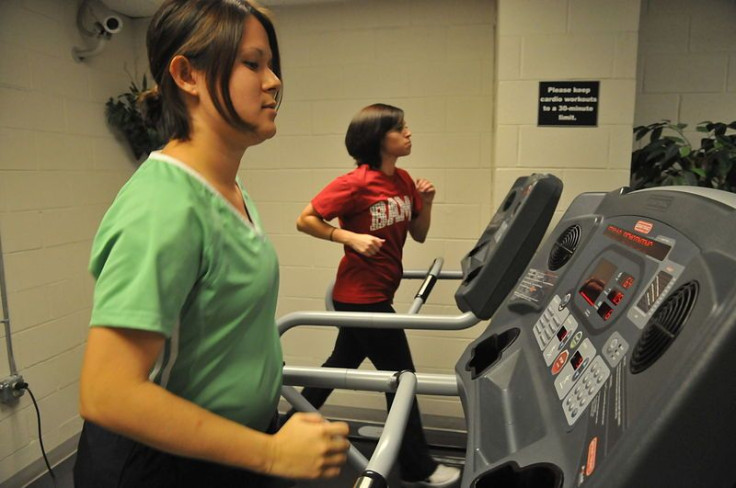Pregnancy And Exercise: Expert Safety Tips On How To Work Out While Pregnant

If you're a fitness nut who goes to the gym seven days a week, prefers to take the stairs, and are constantly on your feet, the news of a pregnancy may cause you to stop in your tracks. While many expecting mothers fear exercising during pregnancy, working out during pregnancy has been shown to provide health benefits for both mom and baby. The American College of Obstetrics and Gynecology recommends pregnant women to do the same amount of cardio exercise as non-pregnant women by staying active for 30 minutes a day. Regular exercise not only helps you stay in shape while sporting a baby bump, it can also improve your ability to cope with labor.
However, it is impportant to exercise safely while pregnant
Duration of Exercising During Pregnancy
“Barring specific pregnancy related complications, pregnant women can continue to exercise throughout their pregnancy, really right up until delivery,” said Allison Bailey, MD, Harvard-trained PM&R specialist to Medical Daily. During exercise, the level of physical discomfort should be taken into account with because of the decreased core strength and pelvic ligament laxity, particularly during late pregnancy.
Isometric exercises are recommended for expecting moms because they provide strength for the ever-changing body of a pregnant woman. In early pregnancy, stabilization exercises on a yoga ball or foam roller are encouraged for use, like expectant mother Jennifer Love Hewitt, who uses an exercise ball for a low-impact workout.. The mantra "no pain, no gain" should not be applied during your pregnancy; in fact, less is often more when it comes to working out. Doing heavy lifting during pregnancy can cause more harm than good to you and your baby, therefore it is important to stick to exercises that do not separate the abdominal muscles nor stretch the muscles further apart.
“Abdominal muscle separations will typically resolve after delivery but it’s important to not make them worse by exercising in a 'sit up' or 'crunch' position,” said Dr Bailey
Exercise Frequency And Intensity During Pregnancy
Don't make drastic changes to your exercise regimin; it can be harmful to the baby’s health. For example, if a pregnant mother is very active and fit throughout the first two trimesters and then becomes completely sedentary, this can cause a large infant growth rate, says Bailey. On the flip side, a pregnant mother who is sedentary at the initial start of her pregnancy and then exponentially increases her exercise level late in pregnancy can predispose her infant to poor growth.
Tip: If your exercise regimen is interrupted, gradually work back up to your starting exercise level and then maintain the same exercise level throughout pregnancy.
Exercises To Treat Back Pain, Hips And Pelvis During Pregnancy
During the progression of pregnancy, expectant moms will likely develop pain in their back, hips, and pelvic area. Your pelvic bones may feel tighter than normal as they are preparing for childbirth. Dr. Bailey recommends these two excercises to ease the pain:
1. Have your back against a wall, feet in front and knees bent. From this position (which decreases stress on the back) women can perform modified squats (wall slides) as well as pelvic tilts. If someone is in better shape and wants more of a challenge this can be done with the arms outstretched or holding a weighted ball.
2. Position yourself on your hands and knees. From this position the back and lower belly can be exercised doing “cat-cow.” For more of a challenge alternating arms and leg lifts can be performed.
Exercise Precautions During Pregnancy
Even after getting the “OK” to work out during pregnancy, it's important to look out for you and your baby’s health. While staying motivated, approach these exercises with care and follow Bailey’s exclusive exercises tips to Medical Daily:
- Avoid exercising in a supine (lying flat on one’s back) position
- Avoid rapid increase in the volume (frequency and intensity) of exercise during pregnancy. If you want to increase the amount of exercise you are getting in pregnancy, you should do this gradually.
- Avoid high-risk forms of exercise such as skiing, scuba diving, etc.
- Be aware of the decreasing core strength that is a universal effect of pregnancy. As a result, you'll be going into your cardio exercise less “stable.” To compensate, ty to balance cardio exercise with conditioning exercises to maintain strength in the back, hip, and pelvic muscles
- If you experience pain, don’t “push through it.” Instead, consult a physician or physical therapist that treats pregnancy-related pain problems.



























